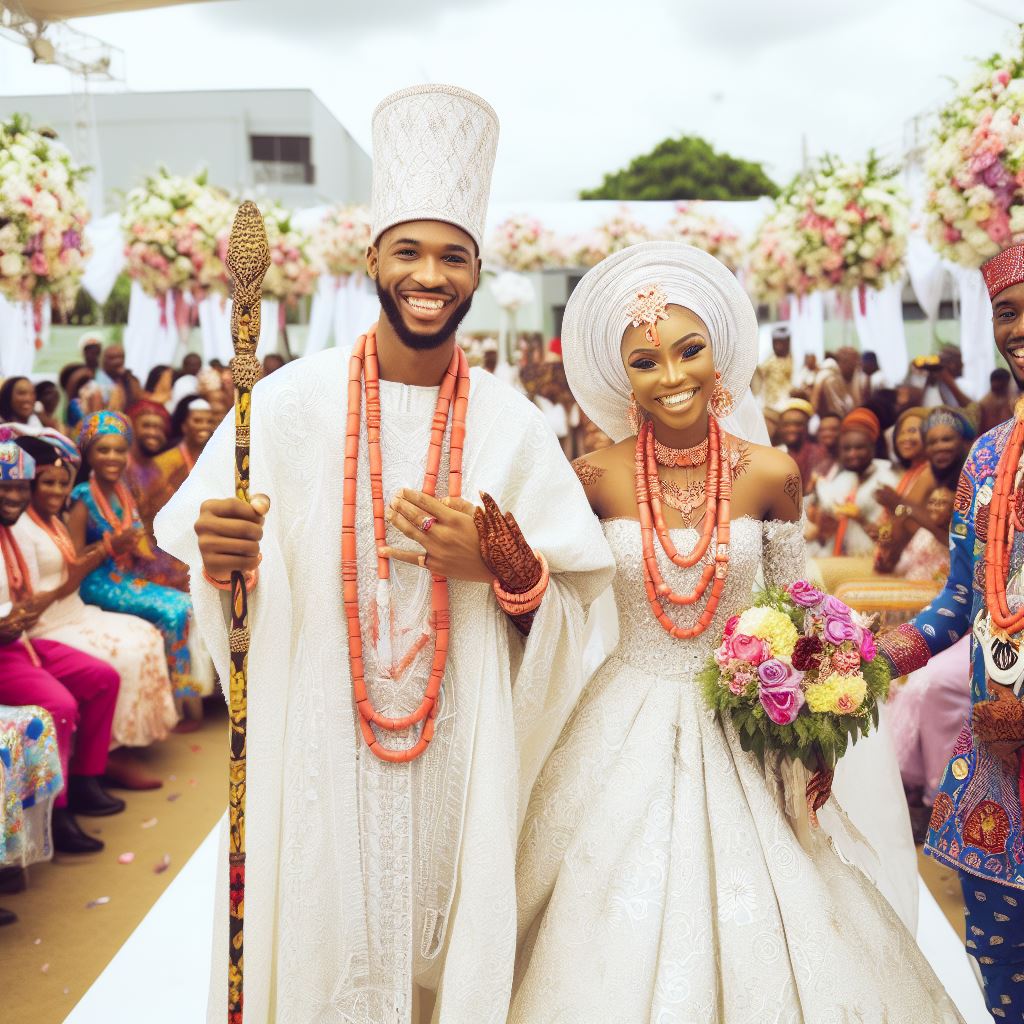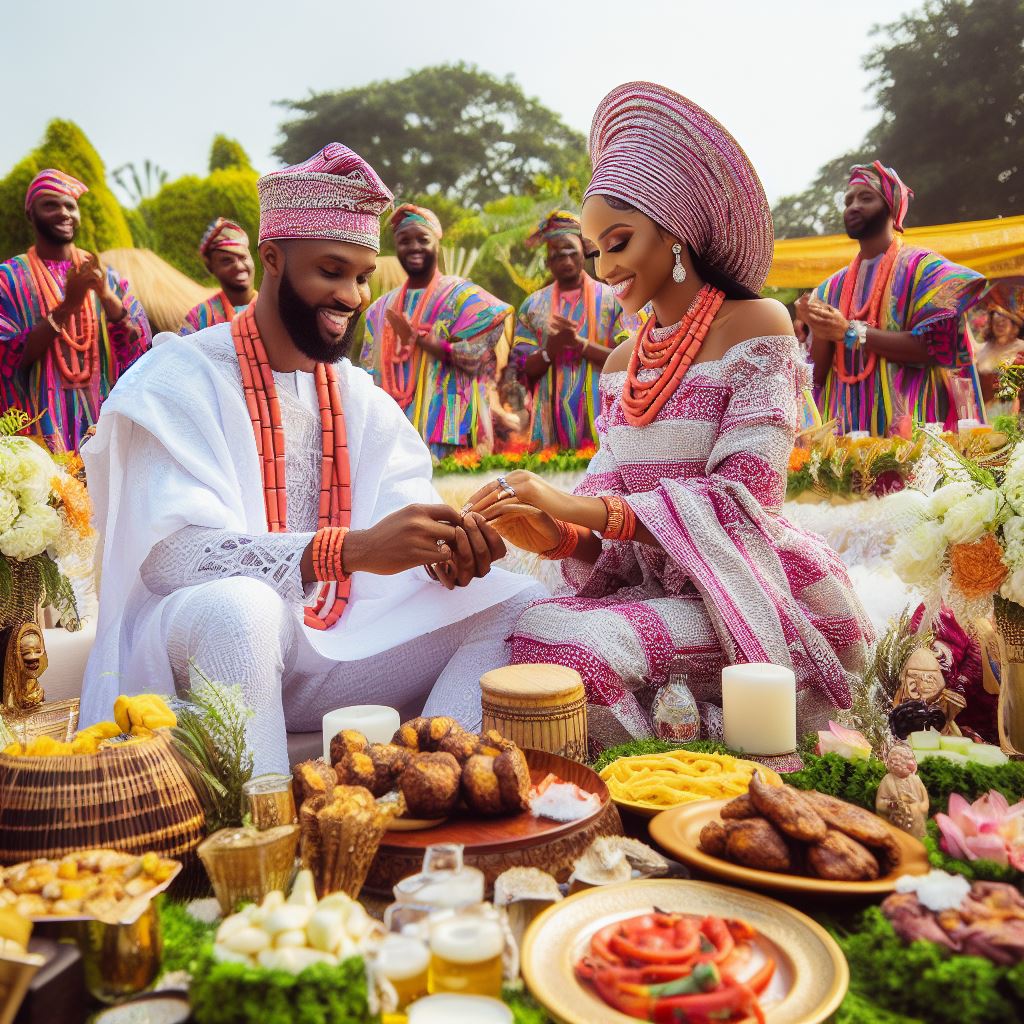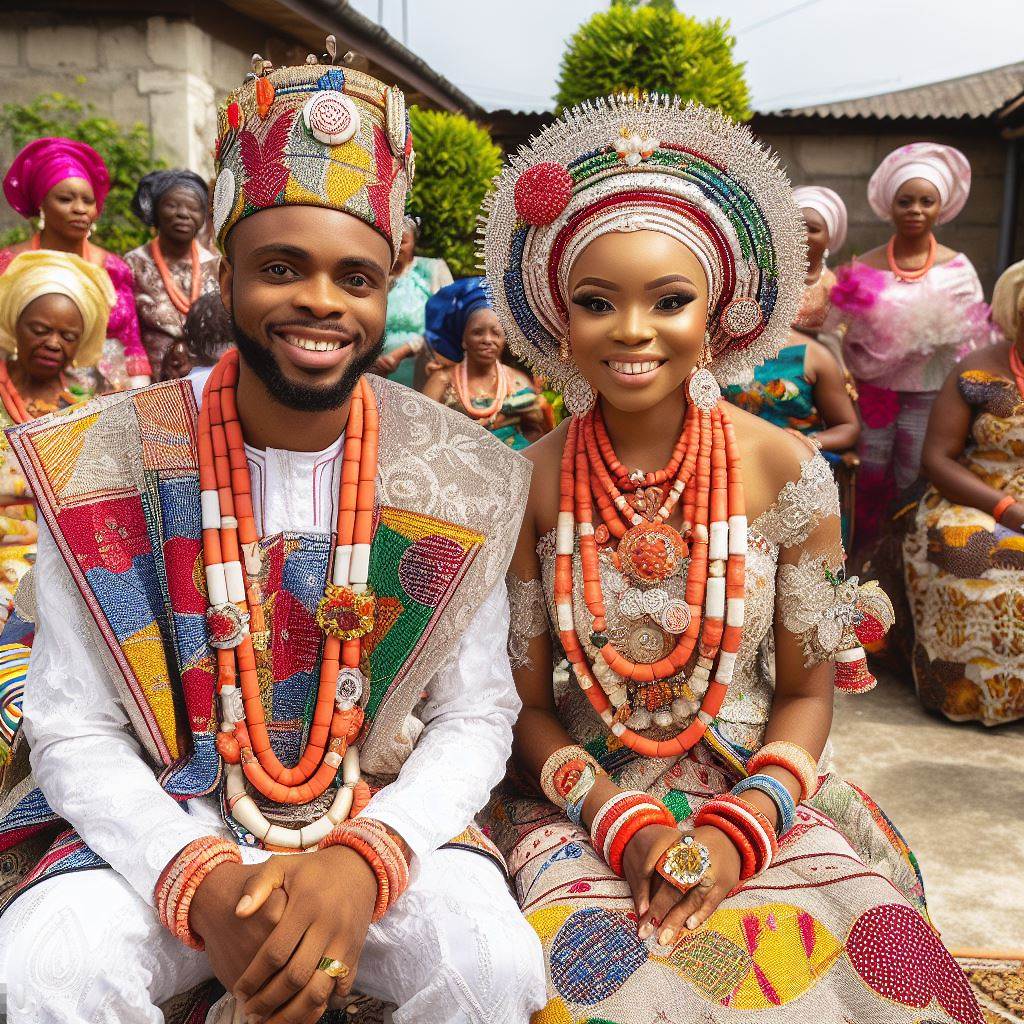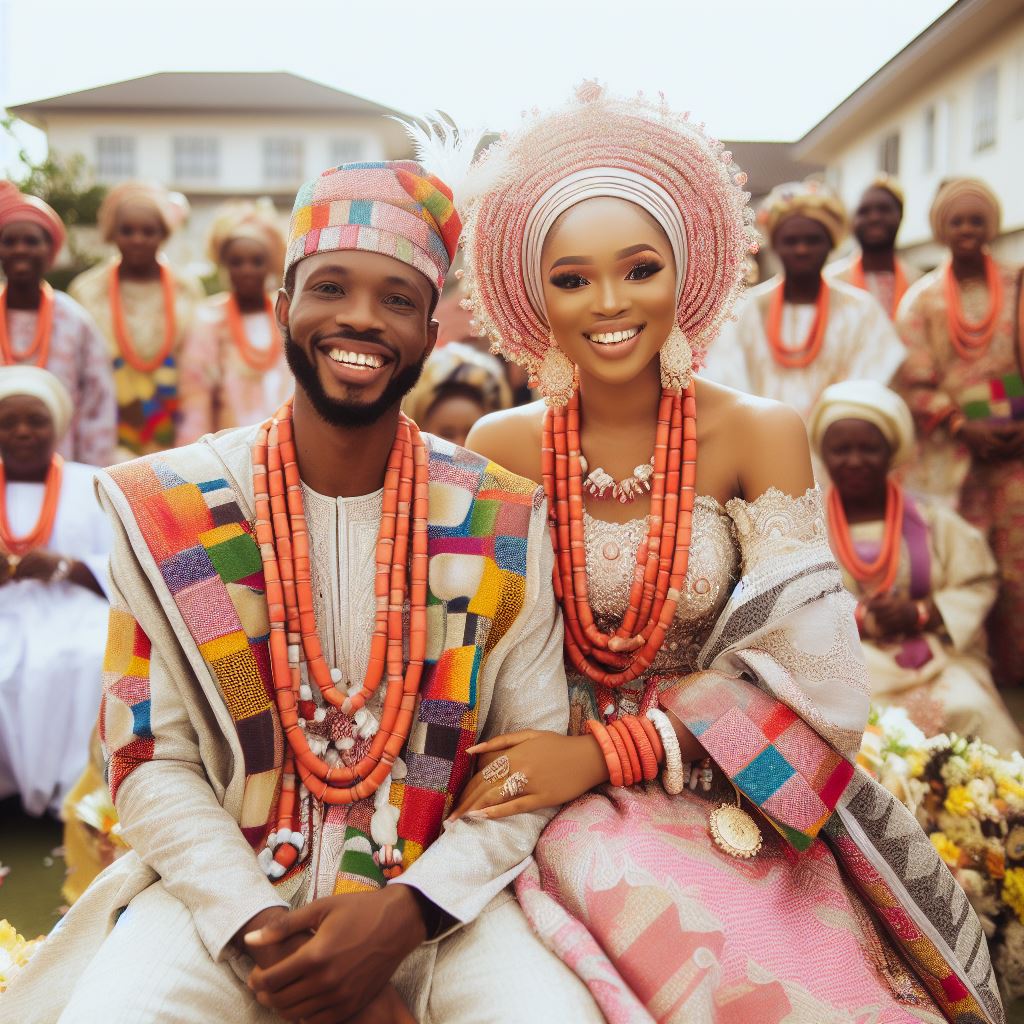Introduction
Nigeria, a country with diverse ethnicities and rich cultural heritage, holds marriage as a vital institution.
In Nigeria, marriage is not solely a union between two individuals but a binding of families and communities.
Nigerian weddings are vibrant and elaborate affairs, reflecting the importance of this institution in their society.
Traditionally, marriages in Nigeria are arranged by parents, with the couple having little say in the matter.
However, with societal changes and the influence of Western culture, more Nigerians are opting for love marriages.
This shift poses a challenge in balancing tradition and change in order to maintain the sanctity of marriage while also accommodating individual desires and preferences.
Importance of balancing tradition and change in Nigerian marriages
The importance of striking a balance between tradition and change in Nigerian marriages cannot be understated.
On one hand, the preservation of cultural practices and customs ensures the continuity of heritage and strengthens familial bonds.
On the other hand, embracing change allows couples to have a voice in choosing their life partners and promotes individual happiness within the institution of marriage.
Nigerian society is navigating these delicate waters by encouraging dialogue between generations, promoting mutual respect, and fostering an understanding of cultural diversity.
This allows for the preservation of traditions that are still relevant and respectful to individual rights and aspirations.
In general, marriage in Nigeria is a dynamic blend of tradition and change.
The ability to balance these two elements determines the success and longevity of Nigerian marriages.
By doing so, Nigerian couples can honor their cultural roots while adapting to the demands of a rapidly changing world.
Traditional Nigerian Marriages
Arranged marriages and parental involvement
- In traditional Nigerian marriages, parents play a significant role in the selection of partners.
- Arranged marriages are still prevalent, where parents find suitable matches for their children.
- The involvement of parents ensures compatibility and the preservation of family values.
- Parents consider factors such as social status, family background, and financial stability to arrange a marriage.
- This traditional practice promotes unity and continuity within the Nigerian society.
Bride price and dowry practices
- Bride price is a customary practice in Nigeria where the groom’s family pays a sum of money or gifts to the bride’s family.
- This practice symbolizes the groom’s appreciation and commitment to the bride’s family.
- Dowry is also exchanged, which includes valuable gifts given by the bride’s family to the groom.
- This tradition not only strengthens the bond between the families but also establishes the social status of the marriage.
- Although criticized as commodifying women, it remains an intrinsic part of Nigerian culture.
Polygamy and the role of extended family
- Polygamy, the practice of having multiple spouses, is allowed in traditional Nigerian marriages.
- This practice is associated with wealth, power, and the ability to provide for multiple families.
- The extended family plays a vital role in supporting and nurturing the marriage.
- Extended family members provide guidance, mediation, and assistance in resolving conflicts.
- Despite changing societal norms, polygamy and the extended family system continue to be prevalent in Nigeria.
Cultural ceremonies and rituals
- Nigerian weddings are celebrated with elaborate cultural ceremonies and rituals.
- The traditional engagement ceremony, also known as the introduction, marks the official announcement of a couple’s intention to marry.
- The ceremony involves the exchange of gifts, prayers, and blessings from elders.
- Other rituals include the traditional wedding, where cultural traditions are followed, including dances, songs, and attires.
- These ceremonies reflect Nigeria’s rich cultural heritage and provide a sense of identity and belonging.
In short, traditional Nigerian marriages involve arranged unions with parental involvement, bride price and dowry practices, polygamy, and the significant role of the extended family.
These customs are deeply rooted in Nigerian culture and are celebrated through elaborate cultural ceremonies and rituals.
While some criticize these practices for their perceived inequalities and commodification, they continue to hold immense significance in maintaining family unity, social structures, and preserving cultural heritage in Nigeria.
Read: Blessings & Gratitude: Christian Anniversary Prayers for Nigerian Couples
Factors Driving Change in Nigerian Marriages
Influence of Western culture and globalization
- Exposure to Western culture through media and communication technologies.
- Increased travel and migration leading to the exchange of ideas and values.
- Adoption of western wedding traditions and practices like white wedding ceremonies.
- Importation of western clothing styles and fashion trends influencing Nigerian wedding attire.
- Western influence challenging traditional gender roles and expectations within marriages.
Education and career opportunities for women
- Greater access to education for Nigerian women, leading to increased empowerment and independence.
- Acquisition of professional skills and qualifications enabling women to pursue successful careers.
- Economic empowerment through education and career options leading to changed dynamics within marriages.
- Delayed marriages as women prioritize education and career before settling down.
- Changing expectations of Nigerian women who now seek spouses who support their ambitions and goals.
Urbanization and modern lifestyles
- Rapid urbanization in Nigeria resulting in the growth of urban centers and the decline of rural traditions.
- Emergence of modern lifestyles characterized by technology, consumerism, and individualism.
- Migration to urban areas leading to exposure to different cultures, values, and perspectives.
- Urban environments providing greater anonymity and freedom for individuals to challenge traditional norms.
- Changing family structures and living arrangements in urban areas influencing marital expectations.
Changing perceptions of gender roles
- Shift in societal attitudes towards gender roles, recognizing the importance of gender equality.
- Increase in women’s rights movements advocating for equal opportunities and treatment.
- Men actively participating in household chores and child-rearing, challenging traditional gender norms.
- Recognition of the negative impact of gender inequality on marital satisfaction and overall well-being.
- Redefinition of masculinity and femininity, allowing for more flexibility in marital roles and responsibilities.
In a nutshell, several factors are driving change in Nigerian marriages. Western culture and globalization have brought about the adoption of new ideas and practices.
Education and career opportunities for women have empowered them and changed their expectations within marriages.
Urbanization and modern lifestyles have also challenged traditional norms, while changing perceptions of gender roles have helped foster greater equality within marriages.
These influences continue to shape the dynamics of Nigerian marriages, balancing tradition and change.
Read: Fortifying Love: Muslim Duas for Marriage Anniversaries in Nigeria
Challenges in Balancing Tradition and Change
Conflicts between individual desires and cultural expectations
- Young individuals often face conflicts when their personal desires clash with society’s traditional expectations.
- For example, choosing a life partner based on love may conflict with the cultural practice of arranged marriages.
- These conflicts create emotional turmoil and stress for individuals who must navigate between their own desires and societal norms.
- It becomes challenging to strike a balance between personal happiness and the expectations set by cultural traditions.
- Respecting cultural traditions is important, but individuals should also be given the freedom to pursue their own happiness.
Resistance from conservative family members
- One major challenge in balancing tradition and change is the resistance faced from conservative family members.
- These family members often hold strong beliefs in upholding traditional practices and resist any deviation from them.
- They may view embracing change as a threat to cultural identity and worry about the erosion of their values.
- Overcoming this resistance requires open and respectful communication to bridge the generation gap.
- Education and enlightenment can help conservative family members understand the importance of embracing changes that bring positive benefits.
Struggles in maintaining cultural values while adapting to modern society
- Another challenge lies in maintaining cultural values while adapting to the ever-changing demands of modern society.
- As technology advances and globalization brings cultural influences from around the world, traditional values may be undermined.
- Struggles arise when individuals try to find a balance between preserving their cultural identity and embracing modernity.
- It is essential to find a middle ground where cultural values can coexist and thrive in the face of changing times.
- Efforts should be made to educate the younger generation about the importance of preserving their cultural heritage.
In essence, balancing tradition and change in the context of marriage in Nigeria comes with its fair share of challenges.
Conflicts between personal desires and cultural expectations often arise, requiring individuals to navigate their way through emotionally challenging situations.
Additionally, conservative family members may resist changes, creating obstacles and difficulties in embracing modern ideas.
Furthermore, maintaining cultural values while adapting to the demands of modern society can be a struggle.
However, overcoming these challenges is crucial to strike a balance that respects both tradition and progressive change.
Open communication, education, and finding a middle ground are key in addressing these challenges and creating a harmonious marriage culture in Nigeria.
Read: Nollywood Movies: Perfect for an Anniversary Date Night
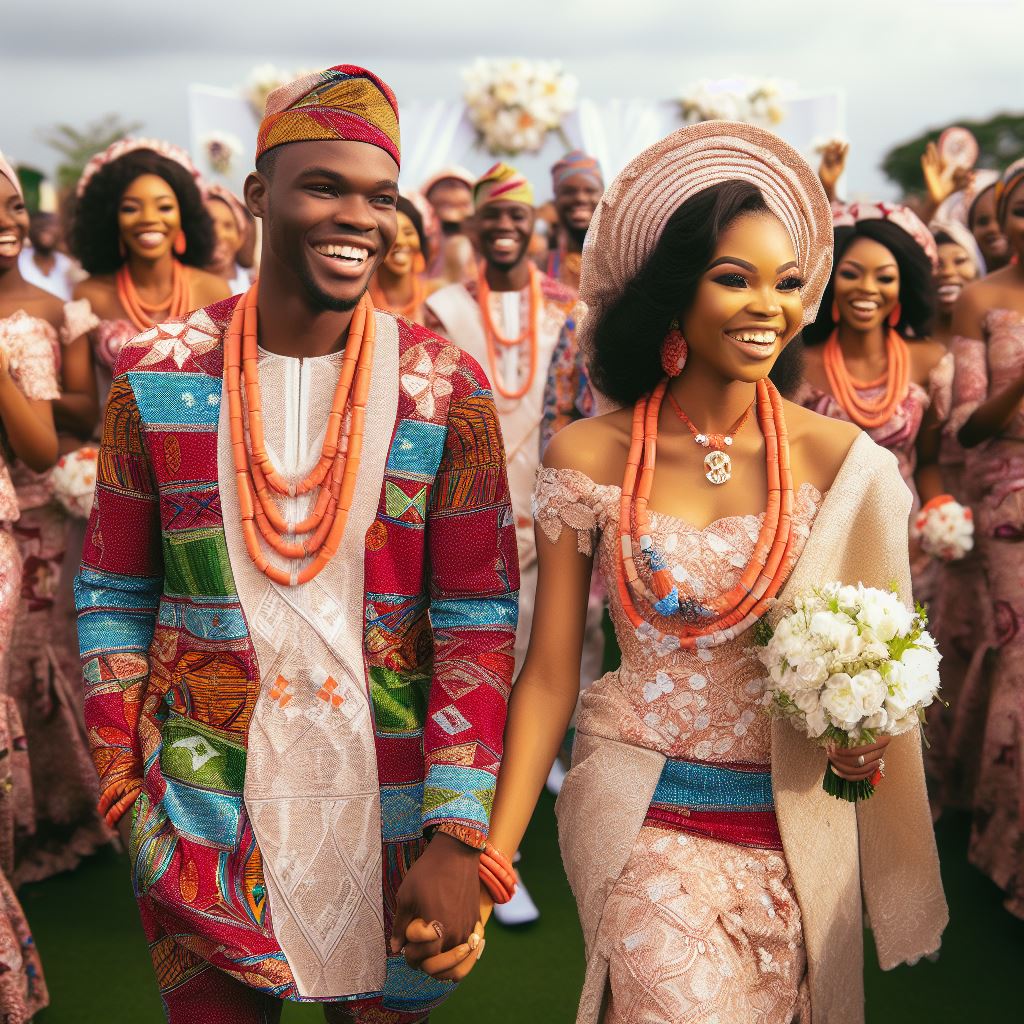
Strategies for Balancing Tradition and Change
A successful and harmonious marriage in Nigeria requires a delicate balance between preserving traditional values and embracing modern change.
Here are some strategies that can help couples navigate this challenging terrain:
Open communication and negotiation between partners
Effective communication is essential for any relationship, and it becomes even more critical when navigating the complexities of tradition and change.
Couples should openly discuss their expectations, fears, and concerns, ensuring that both partners feel heard and understood.
By engaging in honest conversations, they can find common ground and make informed decisions together.
Encouraging mutual understanding and respect for differing beliefs
In a culturally diverse country like Nigeria, it is common for couples to come from different backgrounds and hold different beliefs.
To maintain harmony, it is important to foster mutual understanding and respect.
Achieve this by actively listening to each other, acknowledging diverse traditions, and celebrating and integrating them into married life.
Incorporating traditional elements into modern wedding ceremonies
A wedding is a significant event in Nigerian culture, often blending both traditional and modern elements.
To balance tradition and change, couples can incorporate traditional customs, such as traditional attire, cultural dances, and rituals, into their modern wedding ceremonies.
This not only honors their heritage but also creates a unique and meaningful experience for both the couple and their families.
Education and awareness to challenge stereotypes and gender biases
In Nigerian society, traditional gender roles and stereotypes are deeply ingrained.
To achieve a balanced partnership, couples must challenge these biases through education and awareness.
They can actively seek out resources, workshops, or counseling that promote gender equality and mutual respect.
By unlearning biases and embracing equal partnerships, couples can create a marriage that is both traditional and empowering.
In review, balancing tradition and change in Nigerian marriages is an ongoing process that requires open communication, mutual understanding, and conscious efforts to challenge societal norms.
By adopting these strategies, couples can forge a path that respects their heritage while embracing the opportunities for growth and change in the modern world.
Read: Essential Tips for Strengthening Marriages in Nigeria
See Related Content: Lagos vs Abuja: Where to Register Your Marriage in Nigeria?
Success Stories: Examples of Balance in Nigerian Marriages
Couples who have managed to preserve their cultural heritage while embracing change
- Mr. and Mrs. Adekunle: They have successfully integrated traditional customs, such as the formal introduction ceremony (Igba Nkwu), with modern wedding elements.
- Dr. Chukwu and Mrs. Adebayo: This couple has brilliantly fused the traditional Yoruba engagement rites (Eru Iyawo) with contemporary pre-wedding photo shoots.
- Chief Ibrahim and Mrs. Ngozi: They have demonstrated that it is possible to uphold the Igbo marriage traditions of the bride-price (Umuada) while also advocating for gender equality.
- Mr. and Mrs. Mohammed: Despite being from different religious backgrounds, they have harmoniously blended their Muslim and Christian beliefs within their marriage.
- Engr. Ahmed and Mrs. Funke: This couple has effortlessly combined their cultural traditions from northern Nigeria (Groom’s party-Nikkai) with a modern white wedding ceremony.
Achievements and positive outcomes in balancing tradition and modernity
- Preservation of cultural identity: By maintaining traditional customs, Nigerian couples are able to stay connected with their cultural roots.
- Enhanced unity within families: The amalgamation of tradition and modernity fosters stronger bonds between families and promotes positive intergenerational relationships.
- Cultural exchange and tolerance: Balancing tradition and change in marriages introduces people to different customs, fostering cultural diversity and acceptance.
- Empowerment of women: Many Nigerian marriages have struck a balance by promoting gender equality, giving women equal rights and opportunities within the relationship.
- Harmonious coexistence: By embracing change and respecting tradition, Nigerian couples are able to live harmoniously in a multicultural society.
- Sustained cultural heritage: The successes of these marriages ensure that Nigerian traditions continue to be passed down to future generations.
- Role model for younger couples: Success stories serve as inspiration for young couples, encouraging them to strive for a balance in their own marriages.
Basically, Nigerian couples have showcased their ability to balance tradition and change within their marriages.
These success stories serve as examples of how cultural heritage can be preserved while allowing for modern influences.
The achievements and positive outcomes in these marriages highlight the importance of embracing diversity and fostering equality.
By continuing to find harmony between tradition and modernity, Nigerian marriages will continue to thrive and inspire future generations.
Uncover the Details: Hausa Wisdom: Traditions and Quotes on Marriage
Conclusion
A balanced approach to tradition and change is crucial for successful marriages in Nigeria.
It is important to recognize and respect the deep-seated traditions that form the foundation of Nigerian marriages.
At the same time, couples must also be willing to embrace change and adapt to the evolving societal norms.
This balance ensures that marriages can thrive in a changing world while still holding onto their cultural roots.
It is essential for individuals, families, and communities to continue efforts in fostering healthy and adaptive marriages.
Education and awareness programs can help couples navigate the challenges that come with balancing tradition and change.
Additionally, open communication, mutual respect, and compromise are vital in maintaining strong and fulfilling marriages.
By embracing both tradition and change, Nigerian society can ensure that marriages remain a source of stability and happiness.
Together we can build a future where marriages in Nigeria are not only resilient but also progressive and inclusive.
Let us strive to create a society where all marriages can flourish and contribute to a thriving and vibrant nation.

